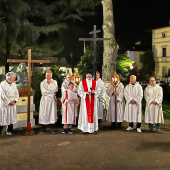Obedience and love can bring salvation

April 15, Friday of the Passion of the Lord
Readings: Isaiah 52: 13 – 53: 12, Hebrew 4: 14 – 16, 5: 7 - 9, John 18:1 – 19:42
The story of the fall of man begins in the Garden of Paradise, and now the story of humanity's salvation begins in the Garden of Gethsemane. In the beginning, humans lived happily in the garden of paradise. Humans live in harmony and peace with the surrounding environment. But then, the man was tempted by Satan and fell into his grasp. Since his fall, humanity has been in a completely different life situation. But God's love for man never goes away. He promised that God would send His Son to save humanity from Satan's grasp.
The Gospel tells us that Jesus entered the garden of Gethsemane. In this garden, he wrestled with and was tempted by Satan. We can sense Jesus' fear as he faces the suffering he foresaw. But Jesus was aware of his duty. He must obey his father's will. After praying, Jesus experienced strength. Thanks to that power, he could face the soldiers led by Judas Iscariot, who Satan had controlled to capture him.
In the garden of Gethsemane, Jesus Christ wrestled with Satan but did not fall following Satan's offer. He did what his father told him to do because only through pain and death could new life be found.
The New Adam, Jesus Christ, appeared with a very unusual attitude. He did not fall into Satan's temptations. His obedience to the will of the Father and his love for man led to salvation.
How do we practice our obedience and love for God and others? Is God's command to us always obeyed and done with full responsibility, even if we sometimes feel its weight?
How about the appreciation and practice of our love for God through our neighbors?
We pray with Our Lady: "Lord, help us." May we indeed be aware and understand the value of obedience and love and be able to live and practice them in life because their fruit can bring salvation. Amen.
Radio Veritas Asia (RVA), a media platform of the Catholic Church, aims to share Christ. RVA started in 1969 as a continental Catholic radio station to serve Asian countries in their respective local language, thus earning the tag “the Voice of Asian Christianity.” Responding to the emerging context, RVA embraced media platforms to connect with the global Asian audience via its 21 language websites and various social media platforms.














